 Textbooks,
Exams, Test Questions and Assessments and Other Resources that Focus on Community
and Problem-Oriented
Policing (COP - POP).
Textbooks,
Exams, Test Questions and Assessments and Other Resources that Focus on Community
and Problem-Oriented
Policing (COP - POP).
COP and POP in modern law enforcement receive a great deal of attention during police promotion exams and assessment center exercises.
What is Community Problem Oriented Policing - also known as COP/POP? What are the best textbooks to study NOW for YOUR career enhancement or for an upcoming promotion exam?
These are the two most important overall topics in modern law enforcement, and have been since the 1980's. In a nutshell- instead of officers responding to problems (911 policing) they should instead spend their very valuable time solving the problems that cause the 911 calls. And, of course, all solutions should involve the community in the planning and implementation.Promotional Exams for Community and Problem Oriented Policing and other police promotion textbooks can be taken by you to use as study material within the Advanced Police Promotional Testing Course. Try a few short, sample exams and online flashcards - at no cost. You'll receive an email with your login in the next few minutes. Then learn more about our police promotion exams and download our expert study system - and ENROLL today!
 Problem-Oriented Policing by Herman Goldstein.
From me; You can pretty
well call this the book that "started it all." This book is cited in
nearly every major article and textbook that covers POP. My simple
and straightforward opinion is that every officer should read it
before being allowed out of field training, and it should be on
every FTO, senior officer and senior deputy, corporal and sergeant
promotion exam.
Community Problem
Oriented Policing titles also make some very difficult
promotional exams because of the mass of studies, opinions and
expert information.
Problem-Oriented Policing by Herman Goldstein.
From me; You can pretty
well call this the book that "started it all." This book is cited in
nearly every major article and textbook that covers POP. My simple
and straightforward opinion is that every officer should read it
before being allowed out of field training, and it should be on
every FTO, senior officer and senior deputy, corporal and sergeant
promotion exam.
Community Problem
Oriented Policing titles also make some very difficult
promotional exams because of the mass of studies, opinions and
expert information.From the publisher; This book, written by one of the most highly respected scholars in the field of policing, presents a critical examination of current police policies and practices and calls for new solutions to the dilemmas we face. It emphasizes understanding the nature of our problems and creating organizational environments conducive to solving them. Visit us for the Problem-Oriented Policing exam, test questions, study guide and flashcards.
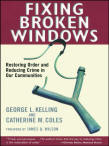 Fixing
Broken Windows - Kelling and Coles. From me; This is an in-depth
and comprehensive textbook that details the 1990s experience of
police agencies around the nation implementing "order maintenance"
as a focus in order to cut back crime. There has been a resurgence
of interest in the Order Maintenance / Broken Windos / Crime
Reduction topics and this textbook has started to be used in
promotion exams.
Fixing
Broken Windows - Kelling and Coles. From me; This is an in-depth
and comprehensive textbook that details the 1990s experience of
police agencies around the nation implementing "order maintenance"
as a focus in order to cut back crime. There has been a resurgence
of interest in the Order Maintenance / Broken Windos / Crime
Reduction topics and this textbook has started to be used in
promotion exams. From the publisher; Based on a groundbreaking theory of crime prevention, this practical and empowering book shows how citizens, business owners, and police can work together to ensure the safety of their communities. George Kelling, one of America’s leading criminologists, has proven the success of his method across the country, from the New York City subways to the public parks of Seattle. Here, Kelling and urban anthropologist and lawyer Catherine Coles demonstrate that by controlling disorderly behavior in public spaces, we can create an environment where serious crime cannot flourish, and they explain how to adapt these effective methods for use in our own homes and communities. Visit us for the Fixing Broken Windowsl exam, test questions, study guide and flashcards.
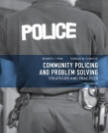
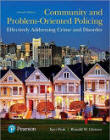 Community Policing and Problem Solving - Strategies and Practices
- Peak and Glensor - 6th and 7th editions - both great textbooks
that do a very thorough job of covering COPPS. The 7th edition has a
slightly different title -
Community and Problem-Oriented Policing: Effectively Addressing
Crime and Disorder. From me; This is a very good book that covers all
the topics in-depth but is a reasonable 300 or so pages. It gets to
and stays on point and has proven to be an excellent text for me to
use for writing sergeant and lieutenant promotional exams.
Community Policing and Problem Solving - Strategies and Practices
- Peak and Glensor - 6th and 7th editions - both great textbooks
that do a very thorough job of covering COPPS. The 7th edition has a
slightly different title -
Community and Problem-Oriented Policing: Effectively Addressing
Crime and Disorder. From me; This is a very good book that covers all
the topics in-depth but is a reasonable 300 or so pages. It gets to
and stays on point and has proven to be an excellent text for me to
use for writing sergeant and lieutenant promotional exams. From the publisher; 6th Edition: This book is about policing at its most important and challenging levels–in neighborhoods and communities across the nation and abroad. Unique in perspective, its focus is on community policing and problem solving–and the processes that are being implemented under COPPS to control and prevent crime, disorder and fear. Extremely applied, this text focuses on daily processes and tactics and how and why agencies are revolutionizing their traditional philosophy and operations. This sixth edition provides the latest on policing in an information age, how the economy is impacting policing practices and new information concerning COPPs initiatives across the United States. Visit us for the Community Policing and Problem Solving - Strategies and Practices exam, test questions, study guide and flashcards.
From the publisher; 7th Edition: An applied, timely approach to “what works” in addressing crime and disorder Community and Problem-Oriented Policing: Effectively Addressing Crime and Disorder, Seventh Edition, is about policing at its most important and challenging levels–in neighborhoods and communities across the nation. Unique in perspective, its focus is on community- and problem-oriented policing and the processes that are being implemented to control and prevent crime, disorder, and fear. Visit us for the Community and Problem-Oriented Policing: Effectively Addressing Crime and Disorder exam, test questions, study guide and flashcards.
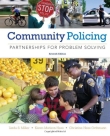
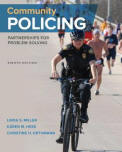 Community Policing Partnerships for Problem Solving - Hess and
Miller. The
Community Policing Partnerships for Problem Solving study guide
along with the
exam from that textbook are one of our most requested promotion
tests. From me; I use this book for promotional exams from
corporal and sergeant right up to lieutenant and captain. It is a
practical and direct title that emphasizes practical strategies and essential
skills to help you apply effective, real-world problem solving
within your law enforcement agency and community. From the
publisher; With a strong focus on problem solving and
community-police partnerships, Community Policing
Partnerships For Problem Solving provides a
practical, up-to-date guide to effective community policing. After a
thorough introduction to the history and philosophy of the movement
that has profoundly shaped modern police operations, the authors
strongly emphasize practical strategies and essential skills to help
you apply effective, real-world problem solving within your
community. The seventh edition maintains this trusted book's proven
strengths while introducing valuable updates and innovations,
including new material on key trends and practices such as community
and officer diversity, ethics and corruption, CompStat and hot-spot
policing, and citizen oversight of police, as well as new features
exploring the impact and importance of technology. Visit us for the
Community
Policing Partnerships for Problem Solving study guide, and you
can also try out the extensive
police
promotion exam for this title.
Community Policing Partnerships for Problem Solving - Hess and
Miller. The
Community Policing Partnerships for Problem Solving study guide
along with the
exam from that textbook are one of our most requested promotion
tests. From me; I use this book for promotional exams from
corporal and sergeant right up to lieutenant and captain. It is a
practical and direct title that emphasizes practical strategies and essential
skills to help you apply effective, real-world problem solving
within your law enforcement agency and community. From the
publisher; With a strong focus on problem solving and
community-police partnerships, Community Policing
Partnerships For Problem Solving provides a
practical, up-to-date guide to effective community policing. After a
thorough introduction to the history and philosophy of the movement
that has profoundly shaped modern police operations, the authors
strongly emphasize practical strategies and essential skills to help
you apply effective, real-world problem solving within your
community. The seventh edition maintains this trusted book's proven
strengths while introducing valuable updates and innovations,
including new material on key trends and practices such as community
and officer diversity, ethics and corruption, CompStat and hot-spot
policing, and citizen oversight of police, as well as new features
exploring the impact and importance of technology. Visit us for the
Community
Policing Partnerships for Problem Solving study guide, and you
can also try out the extensive
police
promotion exam for this title.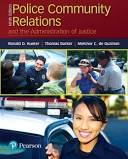 Police
Community Relations and the Administration of Justice - Hunter
and Barker - From me; I consider this an advanced COP title and
recommend this book for promotional exams for sergeant, lieutenant
and captain. It is an excellent choice for any agency where
community policing has been successfully in operation for a number
of years, and officers are familiar with the basics and are ready to
be tested on some advanced topics.
Police
Community Relations and the Administration of Justice - Hunter
and Barker - From me; I consider this an advanced COP title and
recommend this book for promotional exams for sergeant, lieutenant
and captain. It is an excellent choice for any agency where
community policing has been successfully in operation for a number
of years, and officers are familiar with the basics and are ready to
be tested on some advanced topics. From the publisher; Police-Community Relations and the Administration of Justice continues the theme of citizen participation and emphasizes why it is critical to the effectiveness of the criminal justice system. It focuses on the importance of and strategies for positive police-community interactions and addresses the internal and external communities the police serve. The text's interdisciplinary approach draws data and discussions from a wide range of disciplines and gives students a well-rounded perspective to help them better understand and practice positive police-community relations. Visit us for the Police Community Relations and the Administration of Justice exam, test questions, study guide and flashcards.
 Community Policing A Contemporary Perspective - Kappler and
Gaines now in its 8th Edition. From me; This book builds upon the material and concepts first
authored by Robert Trojanowicz, thought by many to be the father of
community policing. I use it for promotional exams from corporal and
sergeant right up to lieutenant and captain. The book will impart a very
thorough understanding of the topic and lead you to many more
articles and books.
Try
my 300+ question promotional exam specifically from this new 8th
edition, and see how you do!
Community Policing A Contemporary Perspective - Kappler and
Gaines now in its 8th Edition. From me; This book builds upon the material and concepts first
authored by Robert Trojanowicz, thought by many to be the father of
community policing. I use it for promotional exams from corporal and
sergeant right up to lieutenant and captain. The book will impart a very
thorough understanding of the topic and lead you to many more
articles and books.
Try
my 300+ question promotional exam specifically from this new 8th
edition, and see how you do!From the publisher; Community Policing: A Contemporary Perspective delineates this progressive approach, combining the accrued wisdom and experience of its established authors with the latest research-based insights to help students apply what is on the page to the world beyond.
This seventh edition extends the road map presented by Robert Trojanowicz, the father of community policing, and brings it into contemporary focus. The text has been revised throughout to include the most current developments in the field, including "Spotlight on Community Policing Practice" features that focus on real-life community policing programs in various cities as well as problem-solving case studies. Visit us for the Community Policing A Contemporary Perspective exam, test questions, study guide and flashcards.
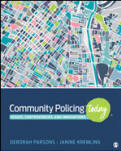 Community
Policing Today: Issues, Controversies and Innovations - Parsons 1E
- Community Policing Today explores the strategies police and
communities can use to find long-term solutions to the public safety
issues facing today’s communities, including gangs, high crime, and
disproportionate minority contact. Framing community policing not as
a program, but as a transformation from traditional policing that
involves sweeping changes in the way police view their role and
relationships with the community. With an emphasis on cutting-edge
trends and impacts on community policing, this book offers readers a
better understanding of the complexity and promise of community
policing today.
Try
our 290+ question promotional exam. Visit us for the
Community
Policing Today: Issues, Controversies and Innovations exam, test
questions, study guide and flashcards.
Community
Policing Today: Issues, Controversies and Innovations - Parsons 1E
- Community Policing Today explores the strategies police and
communities can use to find long-term solutions to the public safety
issues facing today’s communities, including gangs, high crime, and
disproportionate minority contact. Framing community policing not as
a program, but as a transformation from traditional policing that
involves sweeping changes in the way police view their role and
relationships with the community. With an emphasis on cutting-edge
trends and impacts on community policing, this book offers readers a
better understanding of the complexity and promise of community
policing today.
Try
our 290+ question promotional exam. Visit us for the
Community
Policing Today: Issues, Controversies and Innovations exam, test
questions, study guide and flashcards.Promotional Exams of up to 500+ questions for all these Community Problem Oriented Policing and other textbooks can be taken by you within the Advanced Police Promotional Testing Course at PoliceCareer.com.
The most important concepts you need to know about COP/POP
In response to a question, how would YOU describe COP / POP in front of your police sergeant oral board?
"Community policing is
what the individual Department and Community agree that it should be.
Community policing is a partnership between the police and the community
who begin to work together in order to define their most important crime related problems.
Allowing citizens the opportunity to have a voice in how their community will be policed results in the police having a much more accurate understanding of the needs of that community.
Citizens are also accountable for participating in community policing. Also, COP and POP can never be successful without participation by the community.
The community must inform the police of their expectations and then hold them accountable for performance.
Most important, the citizens must accept the fact that they
also have a responsibility to actively participate in this process.
Accountability for results does not just apply to police."
-
Problem Solving with the SARA model
-
Empowerment and
accountability
-
Broken-windows policing
- Compstat
-
Intelligence-led policing
-
Situational Crime Prevention
-
Civilianization
-
Social Capital
-
Community courts.
Sign up for our police promotion newsletters. You will be able to take free promotion exams online to try out our system, and also receive information on police oral boards, in-basket and assessment center topics.
Government and Official Web Resources about COP/POP
 COP and POP
Collaborative Reform improves trust between police agencies
and the communities they serve by providing a means to
organizational transformation around specific issues.
COP and POP
Collaborative Reform improves trust between police agencies
and the communities they serve by providing a means to
organizational transformation around specific issues.
The
Cops.doj.gov publications.
New York City Police
Department -
The Way Forward - Cops Neighborhood Policing Technology. nyc.gov
 Advanced Police Promotion Testing Course
Advanced Police Promotion Testing Course
Study with hundreds more test questions on Community and Problem-oriented policing COP - POP using the Advanced Police Promotion Testing Course at PoliceCareer.com
Sign up for our police promotion newsletters. You will be able to take free promotion exams online to try out our system, and also receive information on police oral boards, in-basket and assessment center topics.
The #1 BEST WAY to Prepare for Police Promotion Exams? Study the Textbooks!
Patrol and Field Operations
Criminal Investigation
Community and Problem-oriented Policing - POP/COP
Police Ethics
Intelligence-Led Policing
Police Legal Textbooks - Law Officer's Pocket Manual and others
Police Leadership
Police Special Topics and Titles, such as below;

Police Corporal - Sergeant Lieutenant - Captain and Above Promotion Testing
Corporal Exam
Sergeant Exam
Lieutenant Exam
Captain Exam
Management and Administration Exams
Promotion Oral Boards (Detective, Corporal, Sergeant and above)
Promotion Assessment Centers (Sergeant and above)
Police Promotion In-Basket (Sergeant and above)
 Case
Law Pro is
the best method for officers to learn the law and prepare for
upcoming exams and assessment center exercises!
Case
Law Pro is
the best method for officers to learn the law and prepare for
upcoming exams and assessment center exercises!
CaseLawPro
will improve your scores in promotional written exams, oral
boards and assessment centers by studying hundreds of factual
law enforcement scenarios, and identifying correct as well as
incorrect responses to each one. Keep your legal skills sharp,
updated and tested - ready for the next round of promotion exams
and assessments!
Test Questions about Community and Problem-oriented Policing that typically appear in Sgt. and Lt. promotion exams
Community policing is a philosophy that emphasizes
_____________.
(A) a problem-solving partnership between the
police and the citizens
(B) a proactive, problem-solving
approach to crime, fear of crime, and crime prevention
(C)
accountability and aggressive zero-tolerance policing
(D) all
of the above
(E) A and B only
The two critical
elements at the heart of community policing are
(A) community
and professionalism.
(B) partnerships and crime prevention.
(C) partnerships and problem solving.
(D) problem solving and
CompStat
(E) community and partnerships.
True or
False: Community policing usually requires a different
management style.
(A) True
(B) False
There are
five broad, strategic organizational approaches currently
operating in contemporary policing. Which item below is NOT one
of those five?
(A) broken-windows policing
(B) CompStat
policing
(C) community policing
(D) problem-solving
policing
(E) evidence-based policing
Community
policing means making changes in the organization. Which item
below is NOT one of those changes?
(A) Permanent shifts and
areas are assigned.
(B) Despecialization reduces the number
of specialized units, channeling more resources toward the
direct delivery of police services to the public.
(C)
Civilianization replaces sworn personnel with nonsworn personnel
to maximize cost effectiveness and reassigns sworn personnel to
where they are most needed.
(D) Teams improve efficiency and
effectiveness by pooling officer resources in groups.
